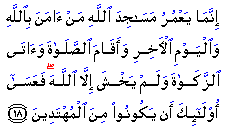Attending the Mosque, Duties of the Poor, Avoiding Extremes
Issue 250 » November 28, 2003 - Shawwal 4, 1424
General
| Living the Quran |
Al-Tawba
(Repentance)
It is expected and required of those of true faith that they attend the mosques. This important act has a number of beneficial facets to it, in particular for those who are living in non-Muslim environments. One may note the following:
Source: |
| Understanding the Prophet's Life |
Duties of the Poor In the framework of an Islamic theory of public expenditure the problem is handled at two levels: motivating the needy individual to work in order to fulfil his own needs and desist from seeking charity as well as motivating the rich individual willingly to give away (as tax and charity) part of his earned income. It is an individual duty of those poor who can work to do so and not to seek charity, whereas it is a collective duty of the rich to give away part of their income to provide for the needy. Several traditions from the Prophet, peace be upon him, underline these duties as noted below. "Charity is
not permissible to a rich person or to one who is able bodied." Source: |
| Blindspot |
Avoiding Extremes The inner reality of veneration for the Divine Law is to follow it with neither excessive license nor obsessive strictness. The goal is the straight path that leads the one who travels it to God. But there is not one of God's commandments without two ways of approach to the Devil: one by deficiency, the other by excess. And it makes no difference which of the two errors overtakes the servant: they appear in his heart as equals. If he is already inclined towards ease and license, the Devil seizes him in this way. He slows him and sits him down, afflicts him with laziness, sloth and inactivity. Then he opens for him the door of interpretation, [vain] hope and other [illusions], until perhaps he abandons entirely all the commandments. If the Devil finds in him vigilance, activity and energy, he abandons his attempts to seize him from the one direction and instead spurs him on to ever greater efforts. The Devil urges this person to do so much that he passes up the straight path through excess; while he urges the first to do so little that he never reaches the straight path nor even approaches it. But his aim with both is [the same]: to keep them off the straight path, either by not drawing near to it or by passing it up. [Surely], many are so afflicted and there is no deliverance [for them] save through deeper knowledge, faith and the strength to resist them and to keep to the middle way. And God is the Helper. Source: |
